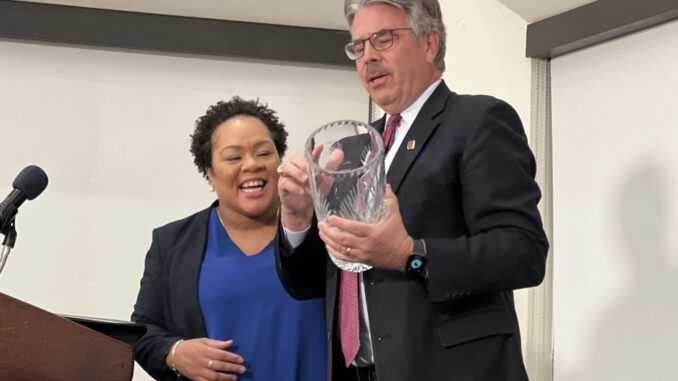
Zach Petroff | Opinions Editor
Dec. 8, 2022
As public trust in the media continues to erode, Duquesne University’s Institute for Ethics and Integrity in Journalism was able to continue its mission in supporting local and national journalism that embodies the principles of credible news reporting.
On Dec. 1, the institute presented Yamiche Alcindor with an award at the National Press Club in Washington, D.C. Alcindor is the host of “Washington Week” on PBS and is a Washington correspondent for NBC News.
Duquesne President Ken Gormley, along with directing fellow Tara Bradley-Steck, faculty fellow Pamela Walck and professional fellows Lynne Hayes-Freeland and Paula Reed Ward, were all present for the event.
“I am humbled to stand before you in this amazing space, where so many titans of journalism have walked the halls,” Bradley-Steck said. “I’m even more humbled by those who continue to pursue stories, dig for evidence, risk one’s safety and challenge authority at a time when doing so is not always seen as admirable or even necessary. Journalism is truly a calling.”
Those unable to attend were able to stream the hour-long event via the Duquesne media department’s social platforms.
“We are honored to be presenting this inaugural award this evening to Yamiche Alcindor, whose political and social justice reporting directly reflect the goals and mission of Duquesne University, and those of our Institute for Ethics and Integrity and Journalism,” Gormley said.
The institute was established last year to promote trust in journalism and news media. It emphasizes the need for accuracy, impartiality, transparency and accountability, while also “creating an ongoing dialogue with the public and regional partners to foster best practices to support local and national journalism.”
After her acceptance speech, Alcindor joined Gormley for a fireside chat, where audience members were given an opportunity to ask the award-winning reporter questions about her experiences and the overall field of journalism.
Alcindor grew up in the Miami area, where her parents laid the foundation for a career in journalism. They strongly encouraged education and reading.
Her mother had a major impact on how she approaches her reporting.
“I’m the daughter of Haitian immigrants and the daughter of a mother who was a social worker and who spent a lot of time going into people’s homes, humbly, at some of the worst times in their life,” Alcindor said. “I always tell people, when I do my journalism, I think a lot about my mother because she’s someone who taught me how to be humble, how to really care for people, how to really go into formal populations and really see people for the struggles that they are. I hope, in my journalism, that I really do try to connect politics with people.”
Learning about the Civil Rights Movement and Emmitt Till defined Alcindor’s “love of the written word.”
“In high school, I learned about civil rights journalism and knew exactly where I wanted to put my love of writing to,” Alcindor said. “I was just taken away by the fact that Jet magazine publishing the picture of Emmett Till and writing about his mother’s story and her courageous decision to have this open casket for her son who had been murdered in 1955. To share her pain, I thought’ that’s the kind of journalism I want to do.’”
She interned at the Miami Herald and earned a bachelor’s degree in English and international relations while minoring in African American studies at Georgetown University. She earned her master’s degree in broadcast news and documentary filmmaking at New York University.
While working as a multimedia reporter for USA Today, Alcindor has covered events such as the Sandy Hook Elementary School shooting, Trayvon Martin’s death, the Ferguson protests and the Baltimore protests. She is currently covering the Biden Administration, along with the impact of the Covid-19 pandemic.
The road to success was not always easy, but her story is an inspiration for those looking to pursue a career in journalism. Alcindor reminisced on stage about some of the struggles she endured as she tried to navigate the field.
“I had people to really help me along the way, so that when I was finding my feet and doing things – like chasing dead wealth on Long Island or driving two hours to report about missing puppies,” Alcindor said. “This was not exactly the civil rights journalism that I had gotten into. They still encouraged me to sort of just do the work. That’s what journalism is. It’s covering a bunch of other stuff, and then finding your way to what you’re passionate about.”
The state of the media was a continuing theme throughout the discussion. When asked by Gormley how to combat the trend of mistrust in the media, Alcindor gave an elegant, yet pointed, response.
“I don’t think that I can personally say anything that’s going to convince people, who already don’t believe what [is being] reported,” Alcindor said. “I think we just have to do good reporting. That means going out into communities. That means being on the ground and not just relying on polls and pundits to tell us what’s happening.”
*Editor’s Note: Paula Reed Ward, who is referenced in the story, serves as adviser to The Duke.

